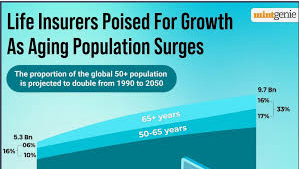Introduction
The global population is aging rapidly, presenting new challenges and opportunities for the healthcare and insurance sectors. As life expectancy increases, so does the need for comprehensive healthcare solutions tailored to the needs of older adults. This blog explores how insurance can effectively meet these healthcare needs, ensuring that aging populations receive the care and support they deserve.
Brief Overview of Insurance and Aging Populations: Meeting Healthcare Needs
Insurance plays a critical role in providing financial protection and access to healthcare services for aging populations. As people age, their healthcare needs become more complex and often more expensive. Insurance products specifically designed for seniors, such as Medicare and long-term care insurance, help cover these costs, ensuring that older adults can maintain their quality of life without the burden of excessive medical expenses.
How Insurance and Aging Populations: Meeting Healthcare Needs Can Help You
Understanding and utilizing insurance options for aging populations can significantly enhance the healthcare experience for seniors and their families. Here are a few ways insurance can help:
Access to Comprehensive Healthcare
Insurance plans tailored for seniors often include coverage for essential services such as routine check-ups, specialist visits, hospital stays, and prescription medications. This comprehensive coverage ensures that aging individuals receive timely and appropriate medical care.
Financial Protection
Healthcare costs can be a significant financial burden, especially for those on a fixed income. Insurance provides financial protection by covering a substantial portion of medical expenses, reducing out-of-pocket costs, and safeguarding retirement savings.
Support for Chronic Conditions
Aging populations are more likely to suffer from chronic conditions such as diabetes, heart disease, and arthritis. Insurance plans often include chronic disease management programs that offer specialized care, medications, and support services to manage these conditions effectively.
Create a Tutorial on How Choosing the Best Insurance and Aging Populations: Meeting Healthcare Needs
Choosing the best insurance plan for aging healthcare needs involves careful consideration and research. Here’s a step-by-step tutorial to help you make an informed decision:
Step 1: Assess Healthcare Needs
Start by evaluating your current and anticipated healthcare needs. Consider any existing medical conditions, medications, and the frequency of doctor visits. This assessment will help you determine the level of coverage required.
Step 2: Research Insurance Options
Look into various insurance plans available for seniors, including Medicare, Medicare Advantage, and long-term care insurance. Compare their benefits, coverage limits, premiums, and out-of-pocket costs.
Step 3: Check Provider Networks
Ensure that the insurance plan you choose includes a network of preferred healthcare providers, including primary care physicians, specialists, and hospitals. Access to trusted healthcare professionals is crucial for effective care.
Step 4: Evaluate Prescription Drug Coverage
Prescription medications can be a significant expense for seniors. Check if the insurance plan covers the medications you need and if there are any restrictions or copayments associated with them.
Step 5: Consider Additional Benefits
Some insurance plans offer additional benefits such as dental, vision, and hearing coverage, wellness programs, and telehealth services. These extras can enhance the overall value of the plan.
How Much Does Insurance and Aging Populations: Meeting Healthcare Needs Charge?
The cost of insurance for aging populations varies widely based on factors such as age, health status, coverage level, and geographic location. Medicare, for example, has different parts with varying premiums and deductibles. Medicare Advantage plans and long-term care insurance also have their own pricing structures. While premiums can be significant, the financial protection and access to necessary healthcare services they provide can be invaluable.
Create a Comparison About Insurance and Aging Populations: Meeting Healthcare Needs
Here’s a comparison of different insurance options available for aging populations:
Medicare vs. Medicare Advantage
Medicare: A federal health insurance program primarily for people aged 65 and older, covering hospital care (Part A) and medical services (Part B). It offers broad coverage but may have higher out-of-pocket costs.
Medicare Advantage: An alternative to traditional Medicare, offered by private insurers. These plans often include additional benefits like dental, vision, and prescription drug coverage, but may have network restrictions.
Traditional Long-Term Care Insurance vs. Hybrid Policies
Traditional Long-Term Care Insurance: Provides coverage for extended care services such as nursing homes, assisted living, and in-home care. Premiums can be high, and benefits are typically specific to long-term care needs.
Hybrid Policies: Combine long-term care coverage with life insurance or annuities. These policies offer more flexibility and may provide a death benefit if long-term care is not needed, but they can be more expensive.
Write Benefits of Insurance and Aging Populations: Meeting Healthcare Needs
Insurance designed for aging populations offers several key benefits:
Peace of Mind
Knowing that healthcare needs are covered can provide peace of mind for seniors and their families, allowing them to focus on enjoying their retirement years.
Access to Quality Care
Insurance plans often include access to a network of high-quality healthcare providers, ensuring that seniors receive the best possible care.
Financial Security
By covering significant medical expenses, insurance protects seniors from financial hardships and preserves their retirement savings.
Support for Independent Living
Long-term care insurance and other specialized plans can provide support for services that help seniors maintain their independence, such as home health aides and assisted living facilities.
Create Conclusion About Insurance and Aging Populations: Meeting Healthcare Needs
As the population ages, the importance of insurance in meeting healthcare needs becomes increasingly evident. By providing access to comprehensive care, financial protection, and support for chronic conditions, insurance plays a vital role in enhancing the quality of life for seniors. Understanding and choosing the right insurance options can help aging individuals navigate the complexities of healthcare, ensuring that they receive the care they need without undue financial stress. The continued evolution of insurance products and services will be essential in addressing the diverse and growing needs of aging populations.




Leave a Comment